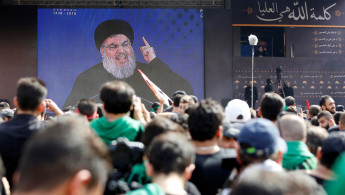Hezbollah warns Iranian fuel tanker sailing to Lebanon 'considered Lebanese territory'
Hezbollah chief Hassan Nasrallah on Thursday said a tanker would set off from Iran imminently to bring desperately needed fuel supplies to Lebanon, in defiance of US sanctions.
The Lebanese presidency, in an apparent response to the claim, quoted the US ambassador as saying that efforts were under way with other regional powers to ease Lebanon's energy crisis.
Many questions remain as to how the Iranian shipment could reach its destination and alleviate the shortages that are crippling Lebanon, forcing hospitals, businesses and government offices shut.
The move, prohibited by American sanctions on Iran's oil industry, could drag Lebanon into the covert naval war between Tehran and Israel. Nasrallah dared Iran's foes to stop the shipment.
"The vessel, from the moment it sails in the coming hours until it enters (Mediterranean) waters, will be considered Lebanese territory," he said during a televised speech to mark the Shia Muslim commemoration of Ashura.
"To the Americans and Israelis, I say: it's Lebanese territory."
He said a first ship would bring fuel for "hospitals, manufacturers of medicine and food, as well as bakeries and private generators".
More vessels would follow to address shortages that have brought Lebanon grinding to a halt, he added.
Neither the Iranian nor the Lebanese governments have confirmed the paramilitary organisation's claim, and Nasrallah did not specify where or how the shipment would reach Lebanon and be offloaded.
'Dangerous'
Lebanese energy expert Laury Haytayan said major questions hung over the purported Iranian shipment, including the amount to be delivered, who would pay, where the ship would dock and whether the details of the transaction had been disclosed to the Lebanese government.
"It is a possibility that these tankers will go to Syria and shipments will be refined there," Haytayan said.
"But this is all prohibited by sanctions, it's not that easy, and since Hezbollah is doing it in public, there is a lot of danger on Lebanon, we are in danger of being sanctioned, or being attacked."
Since February this year, Iran and Israel have been engaged in a "shadow war" in which vessels linked to each nation have come under attack in waters around the Gulf in tit-for-tat exchanges.
Hezbollah is a major political force in Lebanon and is the only group to have kept its arsenal of weapons following the end of the country's 1975-1990 civil war.
The Lebanese presidency later issued a statement thanking the United States ambassador, Dorothy Shea, for what would be an alternative solution to Lebanon's fuel shortages.
The US embassy did not issue any statements, but Shea was quoted by news channel Al-Arabiya as saying that talks were under way with Egypt, Jordan and the World Bank.
"I'm trying to find solutions for the Lebanese people," she was quoted as saying.
A high-ranking Lebanese official who is privy to the negotiations said that the talks centred on waiving US sanctions that are blocking deliveries to Lebanon.
Lebanon has been negotiating for a year with Egypt for gas and electricity to be supplied via Jordan and Syria, but the deal was frozen by US sanctions on Syria, the official said.
Another file is the World Bank financing of that project and of other infrastructure upgrades that could guarantee energy supplies, but that was also threatened by US sanctions.
"Today the US ambassador informed President (Michel) Aoun that the United States would help us on both issues," the official told AFP.
Oil company halts supply
Lebanon is grappling with an economic crisis branded by the World Bank as one of the planet's worst since the mid-19th century.
The bankrupt state can no longer afford key imports, nor can it subsidise essential goods, leading to crippling and sometimes deadly shortages of electricity, petrol and medicines among other things.
A key oil company in Lebanon said on Thursday it would stop supplying its filling stations with fuel for the first time since it started operations in 1926.
The Coral Oil Company said its stocks in the country were running out, and that the government had so far failed to take steps to offload shipments that arrived in territorial waters more than a week ago.
International donors have pledged hundreds of millions of dollars in assistance to the country but have conditioned this on the creation of a cabinet capable of spearheading reforms.
Lebanon's bitterly divided political leaders have repeatedly failed to agree on a new line-up a year after the previous cabinet resigned.





 Follow the Middle East's top stories in English at The New Arab on Google News
Follow the Middle East's top stories in English at The New Arab on Google News


